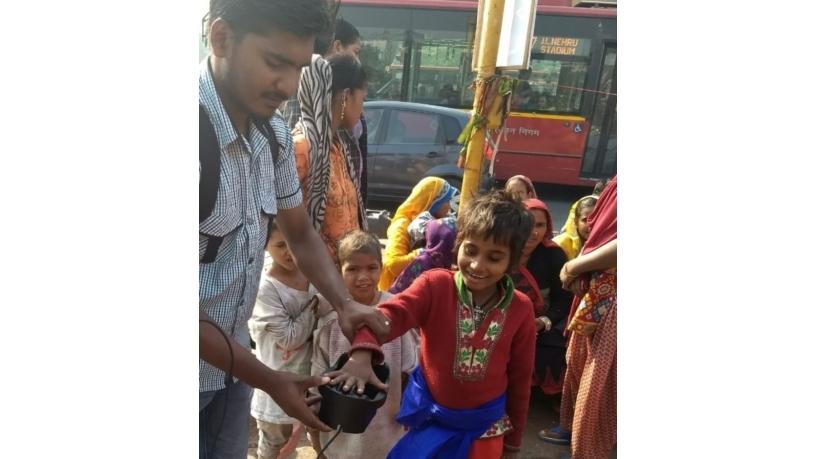
Fujitsu is providing its PalmSecure palm vein recognition technology[1] to the international development and human rights organisation itwillbe.org[2] to help improve the lives and outlook of millions of children living on the streets in India.
The Fujitsu palm vein readers were chosen by itwillbe.org as a reliable, quick and safe way to register and recognise the estimated 11 million homeless children living in India, to be able to provide them with essential medical, emotional and educational support in one of its 81 dedicated rehabilitation centres throughout the country.
Many of India's homeless youth must endure extreme living conditions without any social protection. A lack of documentation to prove their identity makes them particularly vulnerable to child trafficking organisations, abuse and exploitation. Itwillbe.org, together with the Salesian mission of Don Bosco in India, is seeking to protect these children and give them a future. The first step is to register these children to collect important data, such as for medical records, then securely share this information with local government agencies and help centres, where children gain access to essential vaccinations, nutrition programmes, psychological support and more.
Fujitsu PalmSecure recognition technology is a key component of itwillbe.org's dedicated Child Protection People mobile app (PPa), used by social workers in a voluntary process to enrol and later identify and help vulnerable children. The non-intrusive recognition technology uses infrared scans of blood veins in a user's palm to accurately enrol an individual in just milliseconds. All collected data is securely captured and stored as encrypted hash codes of the scanned palm vein pattern.
Itwillbe.org is already in negotiations with other humanitarian aid organisations globally to make the app available to similar initiatives around the world. Biometric identification can facilitate efficient data collection and management in any aid project involving displaced people who do not carry documents, such as refugees, migrants, or victims of human trafficking.
[1] Fujitsu PalmSecure technology uses the very complex vein pattern in the palm of a hand, with great precision, to identify a person. More than five million reference points of the vein pattern are captured by the highly accurate PalmSecure sensor. The capturing and matching process is contactless - the sensor's surface is never touched, for hygienic reasons. An individual's palm vein pattern remains the same for their entire lifetime and is different on the left and right hand - even twins have different palm vein patterns. Vein recognition technology is secure, because the authentication data is inside the body in the person's circulatory system, making it very difficult to forge.
[2] itwillbe.org is an NGO for International Development Cooperation, working with an approach based on education and innovation as highly effective working methods to optimise resources and results focus. Itwillbe.org's projects defend and promote universal human rights, with special emphasis on childhood and development, equality and independence of women.
Online resources
* Read the Fujitsu blog: http://blog.ts.fujitsu.com
* Follow Fujitsu on Twitter: http://www.twitter.com/Fujitsu_Global
* Follow us on LinkedIn: http://www.linkedin.com/company/fujitsu
* Find Fujitsu on Facebook: http://www.facebook.com/FujitsuICT
* Fujitsu pictures and media server: http://mediaportal.ts.fujitsu.com/pages/portal.php
* For regular news updates, bookmark the Fujitsu newsroom: http://ts.fujitsu.com/ps2/nr/index.aspx
Share
Fujitsu South Africa
The evolving nature of every business means changes, enhancements and upgrades to its data centre infrastructure. Businesses are finding data centre upgrades to be not only disruptive, but also costly. There is a constant need to retrain and re-skill data centre staff in order to effectively manage applications while ensuring data availability, security and energy consumption optimisation. Not to mention maintaining compliance and service level agreements.
Fujitsu South Africa's approach to servers, mainframes, storage and integrated systems offers the flexibility to tailor data centre technologies to its customers' specific requirements. It provides the benefits of secure, robust, future-proofed technologies from a single source supported by a unique, consultative approach. This ensures you get exactly what your organisation demands, bringing true business value to companies.
http://www.fujitsu.com/za/
https://www.linkedin.com/company-beta/5386506/
Fujitsu
Fujitsu is the leading Japanese ICT company, offering a full range of technology products, solutions and services. Approximately 155 000 Fujitsu people support customers in more than 100 countries. Fujitsu uses its experience and the power of ICT to shape the future of society with its customers. Fujitsu (TSE: 6702) reported consolidated revenues of 4.5 trillion yen (US $40 billion) for the fiscal year ended 31 March 2017. For more information, please see http://www.fujitsu.com.
Fujitsu EMEIA
Fujitsu promotes a human centric intelligent society, in which innovation is driven by the integration of people, information and infrastructure. In the Europe, Middle East, India and Africa region (EMEIA), its 28 000-strong workforce is committed to digital co-creation, blending business expertise with digital technology and creating new value with ecosystem partners and customers. It enables its customers to digitally transform with connected technology services, focused on artificial intelligence, the Internet of things, and cloud - all underpinned by security. For more information, please visit http://www.fujitsu.com/fts/about/.
Editorial contacts